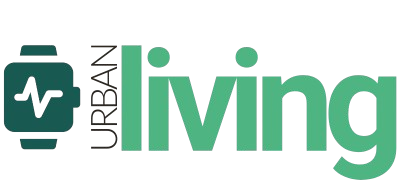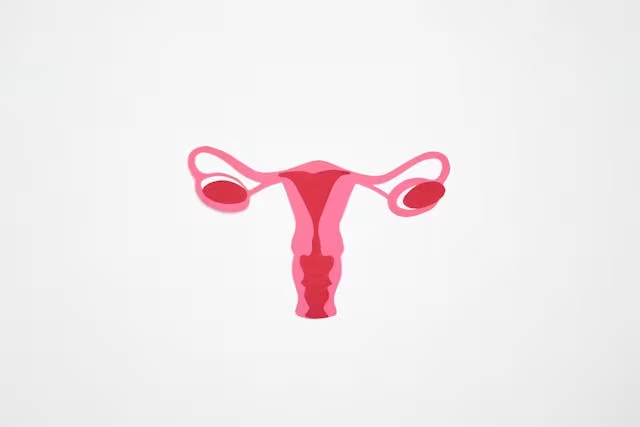In-Vitro Fertilisation (IVF) has become a beacon of hope for many couples in Singapore struggling with fertility issues.
This comprehensive guide explains everything you need to know about IVF in Singapore, from the treatment process to costs, success rates, and preparation tips.
What is IVF?
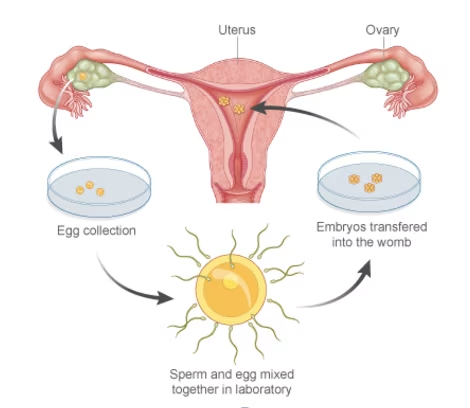
In-Vitro Fertilisation, commonly known as IVF, is an assisted reproductive technique (ART) where fertilization occurs outside the human body.
Unlike natural conception where sperm fertilizes the egg in the woman’s fallopian tubes, IVF involves extracting eggs from the woman’s ovaries and fertilizing them with sperm in a laboratory setting.
Once fertilization occurs and embryos develop, they are transferred back into the woman’s uterus for pregnancy to occur.
IVF is typically recommended after a thorough fertility assessment by a specialist. While the procedure may seem complex and intimidating, it is generally very safe and has helped thousands of couples achieve their dream of having a baby.
You might be interested: Egg Freezing in Singapore
Who Should Consider IVF in Singapore?
IVF in Singapore may be suitable for:
- Women with blocked, damaged, or absent fallopian tubes
- Women diagnosed with endometriosis or uterine fibroids
- Women experiencing ovulation disorders or diminished ovarian reserve
- Women over 35 years old with reduced fertility potential
- Men with low sperm count or poor sperm quality and motility
Read more: Male Infertility in Singapore: Causes, Diagnosis, and Treatment Options
- Couples with unexplained infertility after trying to conceive for at least a year (or 6 months for women over 35)
- Couples with genetic disorders that could be passed to their children
While many people assume IVF is primarily for older women, younger women with specific fertility issues can also benefit from IVF treatment.
Your fertility specialist will conduct assessments to determine if IVF is the right approach for your situation.
Read more: Understanding Low Libido in Women: Causes, Treatment and Impact
The IVF Treatment Process in Singapore
The IVF journey involves several carefully coordinated stages, typically spanning 4-6 weeks per cycle. Here’s what couples can expect during the process:
Step 1: Ovarian Stimulation
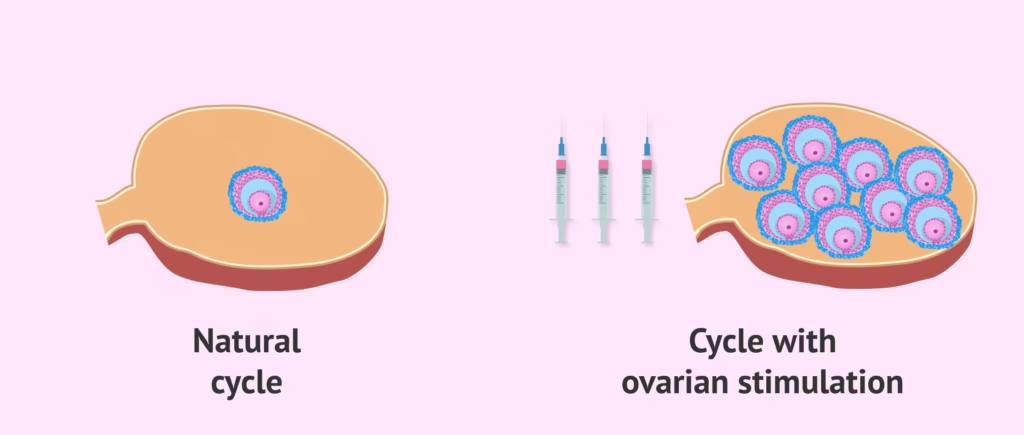
The process begins on day 2 of the woman’s menstrual cycle with hormone injections to stimulate the ovaries to produce multiple eggs instead of the single egg normally released each month.
These fertility hormone injections (Follicle Stimulating Hormone or FSH) are administered daily for approximately 10-12 days.
Most women learn to self-administer these injections at home, though partners can help with this process. The needles used are very small, making the procedure relatively comfortable.
Related article: Testosterone Replacement Therapy in Singapore: Symptoms, Causes, Benefits
Step 2: Monitoring Egg Development
Around day 8-9 of the cycle, the woman visits her gynecologist for an ultrasound scan to assess the maturity of her egg follicles.
Blood tests may also be conducted to measure hormone levels, helping determine the optimal time for egg retrieval.
If the eggs aren’t ready, additional monitoring may be scheduled a few days later.
Once the follicles reach approximately 17-18mm in size, a special trigger injection (Human Chorionic Gonadotrophin or HCG) is given to complete the final maturation of the eggs before collection.
Step 3: Egg Retrieval
Egg retrieval takes place 34-36 hours after the trigger injection. This is a minor surgical procedure performed under sedation or general anesthesia at the fertility center.
Using an ultrasound-guided needle inserted through the vaginal wall, the fertility specialist collects eggs from the follicles.
The procedure typically takes 20-30 minutes, and most patients return home a few hours afterward.
You might be interested: Menopause Treatment Singapore
Step 4: Sperm Collection
On the same day as the egg retrieval, the male partner provides a semen sample. For optimal sperm quality, he should abstain from sexual activity for 3-5 days before collection.
If there are concerns about producing a sample on the day, arrangements can be made to freeze sperm beforehand.
Step 5: Fertilization in the Laboratory
In the embryology laboratory, eggs and sperm are combined for fertilization. There are two main methods:
- Conventional IVF: Eggs and prepared sperm are mixed together in a laboratory dish, allowing natural fertilization to occur.
- Intracytoplasmic Sperm Injection (ICSI): A single sperm is directly injected into each egg using a microscopic needle. ICSI is recommended when:
- Previous IVF attempts resulted in low fertilization rates
- The male partner has poor sperm quality or quantity
- Only a limited number of eggs are available
The fertilized eggs (now called embryos) are cultured in the laboratory for 3-5 days.
During this time, embryologists monitor their development daily, sometimes using an embryoscope to create time-lapse videos tracking embryo growth.
You might like: Endometriosis Treatment in Singapore
Step 6: Embryo Freezing (Optional)
Many clinics now recommend freezing embryos before transfer, as research suggests this may improve success rates.
The theory is that embryos surviving the freezing process demonstrate greater resilience and therefore have higher chances of implantation.
Additionally, freezing allows the woman’s body to recover from the hormonal stimulation before embryo transfer.
Step 7: Embryo Transfer
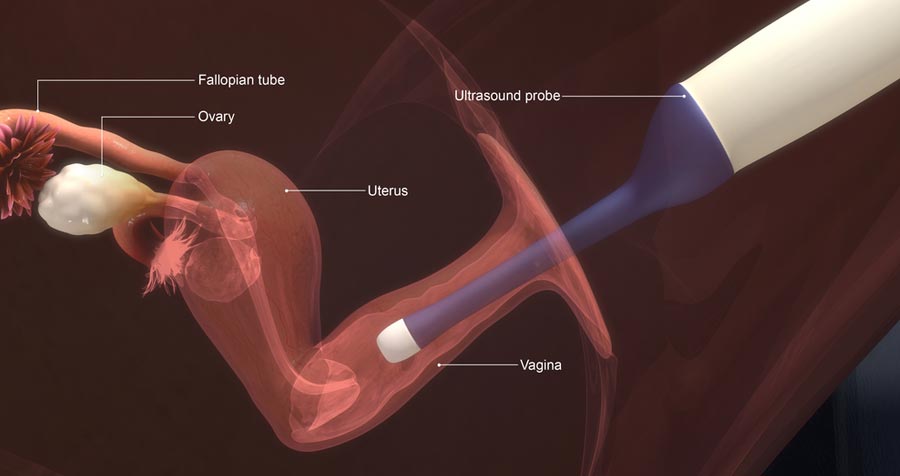
The embryo transfer typically occurs 1-2 months after egg retrieval if freezing is done, or 3-5 days after fertilization in a fresh cycle.
Before transfer, the woman takes hormone tablets to prepare her uterine lining for implantation.
During this simple 20-30 minute procedure (which doesn’t require anesthesia), the best quality embryo(s) are transferred into the woman’s uterus through a thin, flexible catheter.
The procedure feels similar to having a Pap smear, with a full bladder often recommended to facilitate a smooth transfer.
In Singapore, regulations limit the number of embryos that can be transferred:
- Women under 35 in their first or second IVF cycle with high-quality embryos: usually single embryo transfer
- Women aged 35-39 with high-quality embryos: usually single embryo transfer
- Women under 37 with no top-quality embryos: may have two embryos transferred
- Women over 40: may have two embryos transferred
Related article: HPV Vaccination in Singapore: A Comprehensive Guide
Step 8: Pregnancy Test
Approximately two weeks after the embryo transfer, a blood test is performed to determine if implantation has occurred and pregnancy has been achieved.
Even if bleeding occurs, it’s important to complete this test as some women experience implantation bleeding that resembles a period.
Step 9: Embryo Storage (If Applicable)
Any remaining high-quality embryos not used in the current cycle can be frozen for future use.
This provides options if the current cycle is unsuccessful or if the couple wishes to have more children later.
In Singapore, embryos can be stored for up to 5 years, with extensions requiring approval from the Ministry of Health.
What Each Partner Undergoes During IVF
The Woman’s Experience
- Daily hormone injections for approximately 10-12 days
- Multiple clinic visits for ultrasound monitoring
- Egg retrieval procedure under anesthesia
- Hormone therapy to prepare the uterus for embryo transfer
- Embryo transfer procedure
- Ongoing hormone support after transfer
- Two-week waiting period before pregnancy test
The Man’s Experience
- Providing a sperm sample on egg retrieval day
- Supporting his partner throughout the process
- Possibly helping with hormone injections
IVF Success Rates in Singapore
The success rates of IVF in Singapore range between 50-60% per cycle for women under 35 years old. However, these rates decline significantly with age:
- Women under 35: approximately 50-60% pregnancy rate per cycle
- Women 35-39: approximately 30-40% pregnancy rate per cycle
- Women 40-42: approximately 15-20% pregnancy rate per cycle
- Women over 42: approximately 3-7% pregnancy rate per cycle
It’s important to note that pregnancy rates are higher than live birth rates. The live birth rates are approximately 30% for younger women and 5-10% for women over 40.
Most couples who achieve success with IVF do so within 2-3 treatment cycles. Multiple factors affect success rates, including:
- Woman’s age (the most critical factor)
- Quality of eggs and sperm
- Cause of infertility
- Overall health of both partners
- Quality of the embryos
- Receptivity of the uterine lining
- Experience and expertise of the fertility clinic
Preparing for IVF Treatment
Emotional Preparation
IVF can be emotionally challenging, with hormonal fluctuations potentially causing mood swings and the uncertainty of outcomes creating stress. Both partners should:
- Discuss expectations and concerns openly
- Consider counseling before starting treatment
- Connect with support groups or online communities
- Understand that success may not occur in the first cycle
- Maintain open communication throughout the process
Lifestyle Modifications
Several months before beginning IVF treatment, both partners should:
- Adopt a balanced, nutritious diet
- Maintain a healthy weight (BMI between 19-25)
- Stop smoking and reduce alcohol consumption
- Limit caffeine intake
- Reduce stress through relaxation techniques
- Take prenatal vitamins (women) or antioxidant supplements (men)
- Avoid hot baths, saunas, and jacuzzis (men)
- Review medications with your doctor, as some may affect fertility
Financial Planning
IVF treatment requires significant financial investment. In Singapore, costs vary depending on whether you choose public or private healthcare:
Public Hospitals (Subsidized)
- Approximately $10,000 to $15,000 per cycle
Private Hospitals/Clinics
- Approximately $13,000 to $20,000 per cycle
These costs typically include:
- Fertility clinic and specialist fees
- Laboratory fees ($8,000-$10,000)
- Medications ($2,000-$5,000)
- Procedures (egg retrieval and embryo transfer)
Singaporean citizens and Permanent Residents can use their Medisave to help cover IVF costs:
- 1st cycle: up to $6,000
- 2nd cycle: up to $5,000
- 3rd and subsequent cycles: up to $4,000
Note that there is a lifetime Medisave withdrawal limit of $15,000 per patient for assisted reproductive treatments.
Additionally, eligible couples can receive co-funding from the government of up to 75% of costs, depending on citizenship status and other factors.
Potential Risks and Side Effects of IVF
While IVF is generally safe, potential risks and side effects include:
Medication Side Effects
- Hot flashes
- Mood swings and irritability
- Headaches
- Abdominal bloating
- Breast tenderness
- Injection site bruising or soreness
Procedural Risks
- Mild cramping after egg retrieval
- Spotting or light bleeding
- Infection (rare)
More Serious Complications
- Ovarian Hyperstimulation Syndrome (OHSS): A rare condition where ovaries become painful and swollen due to overreaction to hormonal stimulation. Symptoms include abdominal pain, bloating, nausea, vomiting, shortness of breath, and reduced urine output. Seek medical attention if these symptoms occur.
- Multiple Pregnancies: While having twins may seem appealing to some couples, multiple pregnancies carry higher risks of complications for both mother and babies. The strict regulation of embryo transfer numbers in Singapore helps minimize this risk.
Choosing a Fertility Specialist in Singapore
In Singapore, only IVF-accredited gynecologists can perform IVF treatments.
These specialists have undergone rigorous training and must perform a stipulated number of procedures under supervision before receiving accreditation.
When selecting a fertility specialist, consider:
- Their experience and success rates with cases similar to yours
- The clinic’s laboratory facilities and technology
- The range of treatment options offered
- Your comfort level and communication with the doctor
- Accessibility and waiting times
- Cost and payment options
Remember that the fertility journey doesn’t necessarily start with IVF.
A good fertility specialist will conduct thorough assessments and may recommend other treatments before proceeding to IVF.
Frequently Asked Questions
How long does one IVF cycle take?
A complete IVF cycle typically takes 4-6 weeks from the start of ovarian stimulation to the pregnancy test.
This includes approximately 10-12 days of hormone injections, the egg retrieval procedure, 3-5 days of embryo culture, and about two weeks between embryo transfer and pregnancy testing.
If embryo freezing is done, the transfer may be scheduled 1-2 months after egg retrieval.
How many IVF cycles do most couples need?
Most couples who succeed with IVF do so within 3 cycles. Research suggests that cumulative success rates increase significantly over multiple cycles.
However, each couple’s situation is unique, and your fertility specialist can provide personalized guidance based on your specific circumstances and the outcomes of previous cycles.
Can I work during IVF treatment?
Most women can continue working during most of their IVF treatment.
You may need to take time off for monitoring appointments and procedures (particularly the egg retrieval day and possibly the day after).
Some women also choose to take it easy for a day or two after embryo transfer, although strict bed rest is not usually necessary.
What’s the difference between IUI and IVF?
Intrauterine Insemination (IUI) is a simpler, less invasive procedure where prepared sperm is directly placed into the uterus around the time of ovulation.
IVF is more complex, involving egg retrieval, laboratory fertilization, and embryo transfer. IVF typically has higher success rates than IUI and is often recommended after several unsuccessful IUI attempts or for specific fertility issues.
Is bed rest required after embryo transfer?
Complete bed rest is not generally required or recommended after embryo transfer. However, it’s advisable to avoid strenuous activities, heavy lifting, and high-impact exercise for about two weeks after the transfer.
Your fertility specialist will provide specific guidance based on your situation.
Does IVF increase the risk of birth defects?
Current research suggests that the slight increase in birth defect risk associated with IVF is primarily related to the underlying fertility issues rather than the IVF procedure itself.
The overall risk remains low, and most babies born through IVF are healthy. Preimplantation genetic testing can be used to screen embryos for certain genetic disorders before transfer.
How can we increase our chances of IVF success?
To maximize your chances of IVF success:
- Maintain a healthy weight
- Follow a nutritious diet rich in antioxidants
- Take recommended supplements (folic acid for women, antioxidants for men)
- Manage stress through relaxation techniques
- Avoid smoking, alcohol, and recreational drugs
- Follow your doctor’s instructions precisely
- Consider genetic testing of embryos if appropriate
- Choose a reputable clinic with experienced specialists
What happens to unused embryos?
Unused embryos can be:
- Frozen for future use (for up to 5 years in Singapore, with possible extensions)
- Donated to other couples (with appropriate consent)
- Donated for research (with appropriate consent)
- Discarded (following ethical guidelines)
The decision is entirely personal and should be discussed thoroughly between partners and with your fertility specialist.
Will I experience menopause earlier if I undergo IVF?
There is no evidence that IVF treatment causes earlier menopause. The hormones used in IVF stimulate the development of follicles that would naturally die off in that cycle regardless of treatment.
They do not deplete the overall egg reserve beyond what would naturally occur.
Can I choose the gender of my baby with IVF?
In Singapore, gender selection through IVF is not permitted except for medical reasons to prevent serious gender-linked genetic disorders.
The practice is regulated by the Ministry of Health to ensure ethical use of reproductive technology.
Conclusion
IVF has helped countless couples in Singapore overcome fertility challenges and build their families.
While the journey can be physically and emotionally demanding, understanding the process, preparing appropriately, and working with experienced specialists can significantly improve your experience and outcomes.
Remember that every couple’s fertility journey is unique, and what works for one may not work for another.
Open communication with your partner and fertility team, along with realistic expectations and proper self-care, will help you navigate this path with greater confidence and resilience.
If you’re considering IVF, seek early consultation with a fertility specialist to understand your options and develop a personalized treatment plan that addresses your specific needs and circumstances.
